Unit 3 reading Back to thepas1
高中英语:Unit3 Back to the past教案(牛津译林版必修3)

Unit3 back to the past单元教案Lost civilizations 教学案例一、教学内容:教牛津高中英语必修模块三Unit 3二、课型:阅读课三、教学设计思路Lost civilizations 是一篇有关人类消失的文明的文章。
在教学的设计上,以人类文明这一主线把各项活动贯穿起来。
通过一系列的练习和活动逐步加深学生对文章的掌握和理解,并最终达到综合运用的目的。
笔者力求通过本课的教学使学生了解人类灿烂的古代文明。
引导学生形成珍爱和保护人类文化遗产的观念。
同时掌握阅读日记的技巧,及有关人类文化的相关词汇。
四、教学目标1〕解有关人类灿烂的古代文明,培养热爱人类文明,保护人类悠久文化的感情;2〕会描述历史及事实,会用英文表达情感;3〕使学生掌握阅读日记的技巧,提高阅读能力;4〕掌握有关人类文明的词汇。
五、教学重点、难点1〕培养学生阅读技巧,提高学生阅读能力;2〕培养学生英语语言的综合运用能力。
六、教学过程Step1. Lead-in1.Questions1) China has a long history, in the past thousands of years, Chinese people have built many magnificent structures. Can you name some buildings that could represent ancient civilizations in China?2) Around the world, people also built a lot of magnificent structures. Do you know about them?〔设计说明〕以问题导入,引导学生从熟知的中国文化谈起,并扩展到谈论世界文化,使学生易于接受。
2. Watch the pictures representing ancient civilizations. Introduce these pictures to the students.〔设计说明〕1〕面的内容相衔接。
新教材高中英语UNIT3Backtothepast导读话题妙切入学案译林版选择必修性
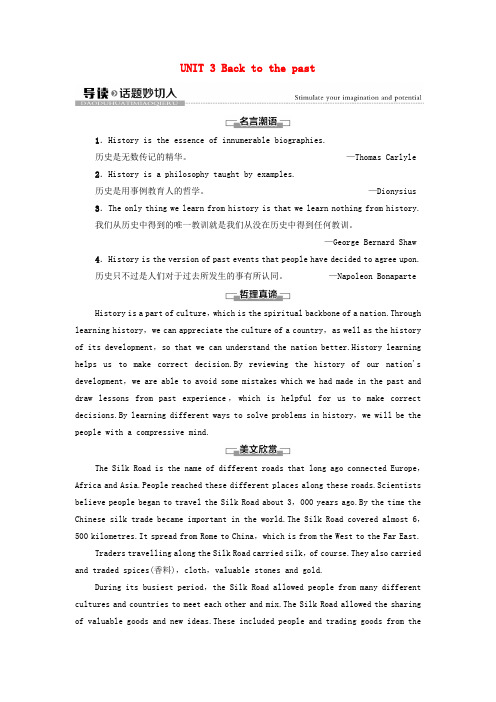
UNIT 3 Back to the past1.History is the essence of innumerable biographies.历史是无数传记的精华。
—Thomas Carlyle 2.History is a philosophy taught by examples.历史是用事例教育人的哲学。
—Dionysius 3.The only thing we learn from history is that we learn nothing from history.我们从历史中得到的唯一教训就是我们从没在历史中得到任何教训。
—George Bernard Shaw 4.History is the version of past events that people have decided to agree upon.历史只不过是人们对于过去所发生的事有所认同。
—Napoleon BonaparteHistory is a part of culture,which is the spiritual backbone of a nation.Through learning history,we can appreciate the culture of a country,as well as the history of its development,so that we can understand the nation better.History learning helps us to make correct decision.By reviewing the history of our nation's development,we are able to avoid some mistakes which we had made in the past and draw lessons from past experience,which is helpful for us to make correct decisions.By learning different ways to solve problems in history,we will be the people with a compressive mind.The Silk Road is the name of different roads that long ago connected Europe,Africa and Asia.People reached these different places along these roads.Scientists believe people began to travel the Silk Road about 3,000 years ago.By the time the Chinese silk trade became important in the world.The Silk Road covered almost 6,500 kilometres.It spread from Rome to China,which is from the West to the Far East.Traders travelling along the Silk Road carried silk,of course.They also carried and traded spices(香料),cloth,valuable stones and gold.During its busiest period,the Silk Road allowed people from many different cultures and countries to meet each other and mix.The Silk Road allowed the sharing of valuable goods and new ideas.These included people and trading goods from theMediterranean,Persian,Magyar,Armenian,Bactrian,Indian and Chinese areas.All these peoples travelled the Silk Road,and they shared goods,stories,languages,and cultures.In modern times,the old Silk Road routes are still used,but now they are crossed by trains instead of camels and horses.There is even a Silk Route Museum in Jiuquan in China.It has over 35,000 objects from all along the Silk Road.In this way,China protects the history of many countries and peoples.[探究发现]1.How many kilometres did the Silk Road cover?Almost 6,500 kilometres.2.What did traders carry along the Silk Road?Silk,spices,cloth,valuable stones and gold.。
牛津译林版高中英语必修三Unit3BacktothepastReading课件共27张PPT

Because it was a stopping point on the famous Silk Road between the East and the West
5. How do many people think Loulan disappeared?
• parts of a building that remain after it has been badly damaged or destroyed
• huge
• take control of
• provide space for
erupt represent unfortunately wealthy ruins
C1 How well did you understand the details in the diary? Read it
again carefully and answer the following questions.
1. What happened to Pompeii in August AD 79?
Are you familiar with these famous Chinese historic sites ?
The Summer Palace
The Forbidden City
The ruins of Yuanmingyuan
The Ming Tombs
The ruins of Yuanmingyuan are located in
Reading
Date 15th July
16th July
牛津译林版高中英语必修三《Unit3 Back to the past》 Reading 教案 1

牛津译林版高中英语必修三Unit 3 Reading 教学设计The article Lost civilizations is about a cultural expedition to sites of lost civilizations. Th e reading text is made up of several excerpts from the travel diary kept by a Canadian st udent about her travel experience in Pompeii in Italy and Loulan in China. Try to gain s ome information about ancient civilizations,to practice and reinforce your reading compr ehension. The Reading strategy in this unit teaches you how to read diary entries. You ar e expected not only to master this strategy but apply it to your future study as well. Step1: Lead—in1. Hi,everybody. Please enjoy some pictures and try to say something about them. (Fro m the pictures,we can see the tall buildings,castles,walls and so on are all in ruin s now. Most of them are completely destroyed .Although they are in ruins,yet they wer e once magnificent and wonderful in history. From them we dare say they are lost civiliz ations. Lost civilizations means ancient buildings,cultures and countries that no longer ex ist.)Please look at the picture. Do you know what it is?Yes,it’s the Great Wall in Ch ina. In the past thousands of years,people have built many magnificent structures around the world. China has a long history. Can you name some buildings that could represent ancient civilization in China?(The Great Wall,the Summer Palace,the Temple of He aven,the Thirteen Tombs of the Ming Dynasty,the Confucius Temple,the Silk Road,Royal Gardens of Suzhou.) Have you ever been to these places?If so,can you tell u s more about them?And will you show us some photos you took in those places?2. Can you name some of the lost civilizations you know in the world?For example,Ancient China,Ancient Egypt,Ancient Greece,Ancient Rome,Atlantis,Mori in New Zealand,Byzantine Empire,Mayan Civilization and Ancient India. Have you ever heard of Pompeii in Italy and Loulan in ancient China?Are you curious about what thetwo cities looked like in the past?How did people in the two cities use to live?Can you guess why people disappeared from the two cities?What happened to them?Can you imagine how people felt at their last glance at their cities?Do you know how the two cities were discovered a thousand years later?Step2: fast reading for general ideas.Let’s skim the passage and try to find answers to those questions. There are many place nam es. You have only to the dates and the place names needed to any questions.1.What country is the author from?(Canada )2. What is one main similarity between Pompeii and Loulan?(Both of them became lost civilizations about 2,000 years ago.)3. Who was made director of the Pompeii dig in 1860?(The Italian archaeologist GiuseppeFlorally.4. Who is professor Zhang?(An archaeologist from the local cultural institute.)Step 3: Detailed reading for important information1. Let’s reread the diary entries and complete Part C1 on page 44 individually to check your reading comprehension and your ability to read and identify details.Answers C11 Mount Vesuvius erupted and lava,ash and rocks poured out of it onto the surrounding countryside. All the people in Pompeii were buried alive,and so was the city.2 I t was discovered in the 18th century when a farmer found some stone with writing on it.People started to dig in the area for treasure,which caused much damage. So in 1860,the Italian archaeologist Giuseppe Florally was made director of the Pompeii dig3 With these stones,people did not have to step in the mud in the streets on rainydays.4 Because it was a stopping point on the famous Silk Road between the East and the West.5 It was gradually covered over by sandstorms from AD 2000 to AD 500.6 She felt that it was a pity.2. Exercises in part C2 on the page 44 serve as a strengthening activity to identify the author’s personal feelings and opinions as well as what they have done. Do you know what expressions usually help to talk about personal feelings?(Some sentence patterns s uch as I feel ...,I think ...;or sentences with adjectives or adverbs to express strong p ersonal opinions such as luckily,surprisingly,or amazing.)AnswersC2 1 E 2 A 3 E 4 E 5 A 6 A 7 E 8 AApart from the dates,the place names and the facts,the author's own feelings andopinions also form an important part in each diary entry. Please go through the article a gain and underline the sentences which you think express the author's personal feelings and opinions.3. Please discuss in pairs about what features are usually included in diary entries. T hink about how many of the features you list can be found in the article lost civilizations. (Dates,names of places,facts,historical information,personal feelings,personal o pinions.) Read the Reading strategy. Please note that in travel diaries it is very important to include dates,place names,facts,historical information and personal emotions and opinions. Therefore,while reading diary entries,you should pay special attention to sen tences containing the information.4. Please pay special attention to Part E on page 45. Part E is an e-mail Ann writes to Jane about her experiences in the two historical sites. The e-mail serves as a summar y of the diary. Complete it individually first and then I’ll check your answers with the w hole class.Answers:E (1) represent (2) Pompeii (3) commercial (4) civilizations (5) volcano(6) erupted (7) sand (8) ruins (9) treasure (10) archaeologist Step 4: Post-reading activities1. Let’s do a storytelling activity in groups of four. I’ll assign one part of Ann's travel di ary to each group. This activity can help you deepen your understanding of the diary and develop your speaking ability as well. The other students may ask each group questions about the dates,places,facts or personal feelings. You are encouraged to use your ima ginations to ask and answer as many reasonable questions as possible.2. To consolidate your speaking ability,read the instructions for Part F. Discuss with yo ur partners the questions listed. Share your opinions and report your answers to the class.3. Let’s read the article in Part B in Reading on page 111 in your Workbook. You are ex pected to answer the questions to check your understanding of the article. Here are more questions about Part B:(1) Where was the beautiful and wealthy island-continent of Atlantis?(It was situated in the middle of the Atlantic Ocean and was a centre for trade and commerce.)(2) What did people grow on the island?(They used to grow many different kinds of vegetables,fruits and nuts there.)(3) What kind of life did people live there?(For many years the people there lived si mple,honest and happy life.)。
高一英语Module 3 Unit 3 Back to the past译林出版社知识精讲
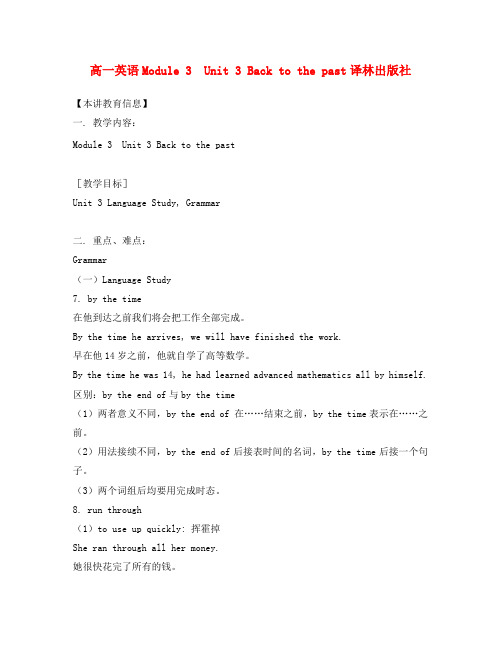
高一英语Module 3 Unit 3 Back to the past译林出版社【本讲教育信息】一. 教学内容:Module 3 Unit 3 Back to the past[教学目标]Unit 3 Language Study, Grammar二. 重点、难点:Grammar(一)Language Study7. by the time在他到达之前我们将会把工作全部完成。
By the time he arrives, we will have finished the work.早在他14岁之前,他就自学了高等数学。
By the time he was 14, he had learned advanced mathematics all by himself. 区别:by the end of与by the time(1)两者意义不同,by the end of 在……结束之前,by the time表示在……之前。
(2)用法接续不同,by the end of后接表时间的名词,by the time后接一个句子。
(3)两个词组后均要用完成时态。
8. run through(1)to use up quickly: 挥霍掉She ran through all her money.她很快花完了所有的钱。
(2)to rehearse quickly: 匆匆排练我们再排练一下第一场。
Let's run through the first act again.(3)to go over the salient points or facts of: 匆匆看过,把……的突出点或事实过目一下The crew ran through the preflight procedures.机组人员又复习了一遍飞行前的程序。
We ran through the witness's testimony before presenting it in court.在法庭上出示之前,我们先过目一下见证人的证词。
高中英语 Unit 3 Back to the past Reading课件 牛津译林版必修3
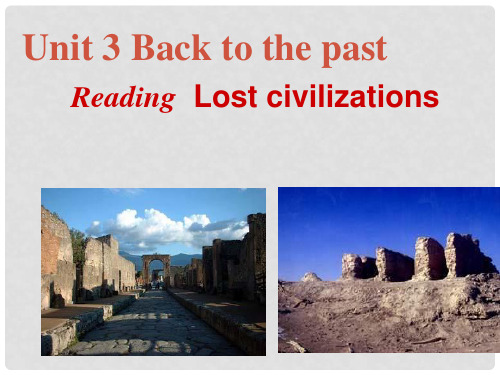
Are you familiar with these famous Chinese historic sites ?
Unit 3 Back to the past
Reading Lost civilizations
BRAINSTORMING
• In the past thousands of years,people have built many magnificent structures around the world. China has a long history. Can you name some buildings that could represent ancient China civilization in China?
Both of them became lost civilization about 2,000 years ago.
3. Who was made director of the Pompeii dig in 1860? The Italian archaeologist Giuseppe Fiorelli.
A Read the diary entries quickly and answer these questions.
1. What country is the author from? Canada.
2. What is one main similarity between Pompeii and Loulan?
高中英语 Unit 3 Back to the past Reading and word study(第1课时)课件
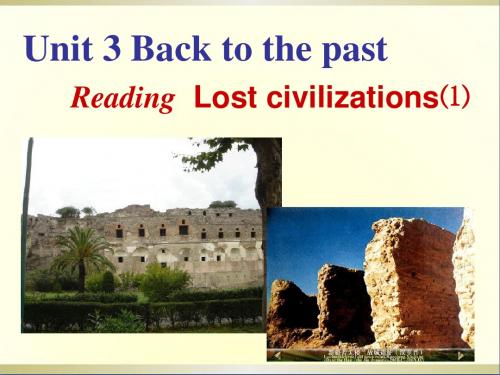
Fill in the blanks with proper words.
Italy Both Pompeii in ________and Loulan in China civilizations about 2000 years ago. Iost __________ became _____ founded in the 8th century BC and was Pompeii was ________ taken_______ over by the Romans in 89BC. On 24th _____ erupted and the city Aug.AD79, Mount Vesuvius _________ buried _____. alive Loulan was a _________ stopping was _______ point on the Silk Road. It disappeared under the ______ remains left. Some ______. sand There are just a few ________ treasures _________, such as coins and painted pots, were found.
Pompeii (Italy)
Loulan (China)
Read the passage quickly and answer these questions.
牛津译林版高中英语必修三《Unit3 Back to the past》Reading 教学设计 1.1

牛津译林版高中英语必修三单元:Unit 3 Back to the past板块:Reading课堂设计指导思想:本节课是以听、说、读为主的课文理解教学课。
通过听课文,阅读课文和问答对文章进行初步理解。
再通过列表比较和复述课文进一步理解课文,最后通过讨论深化主题。
Teaching aims:1.Make sure that student understand the text.2.Help the students develop the ability of reading diary entries.3.Make sure that students grasp the main idea of the text by retelling the text.4.Enable the students to talk about the topic of civilization in English.Teaching procedures:Step 1 Lead-inThe teacher begins the lesson by showing the picture of Pavarotti and Beijing Opera to compare China with Italy.The teacher introduce the topic: Pomprii vs. Loulan—Lost civilizations.【设计说明】通过有关中国和意大利的话题引入主题,调动学生的学习热情和兴趣,寓教于乐,水到渠成导入本课主题。
Step 2 ListeningAsk students to listen to the tape recording and answer the question:What is one main similarity between Pompeii and Loulan?【设计说明】通过听课文录音和回答问题完成对课文的初步理解。
高中英语 Unit 3 Back to the past Reading课件 牛津

Are you familiar with these famous Chinese historic sites ?
A Read the diary entries quickly and answer these questions.
1. What country is the author from? Canada.
2. What is one main similarity between Pompeii and Loulan?
Unit 3 Back to the past
Reading Lost civilizations
Brainstorming
• In the past thousands of years,people have built many magnificent structures around the world. China has a long history. Can you name some buildings that could represent ancient China civilization in China?
Both of them became lost civilization about 2,000 years ago.
3. Who was made director of the Pompeii dig in 1860? The Italian archaeologist Giuseppe Fiorelli.
高中英语Unit3BacktothepastSectionⅠReading(Ⅰ)(Welcometotheunit
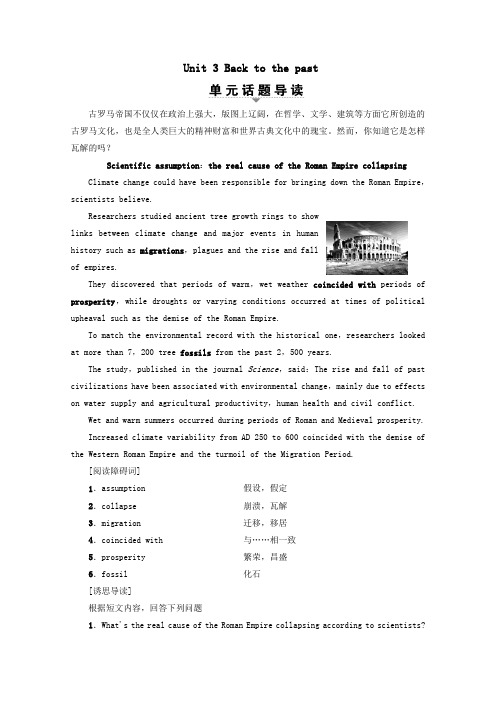
Unit 3 Back to the past古罗马帝国不仅仅在政治上强大,版图上辽阔,在哲学、文学、建筑等方面它所创造的古罗马文化,也是全人类巨大的精神财富和世界古典文化中的瑰宝。
然而,你知道它是怎样瓦解的吗?Scientific assumption:the real cause of the Roman Empire collapsing Climate change could have been responsible for bringing down the Roman Empire,scientists believe.Researchers studied ancient tree growth rings to showlinks between climate change and major events in humanhistory such as migrations,plagues and the rise and fallof empires.They discovered that periods of warm,wet weather coincided with periods of prosperity,while droughts or varying conditions occurred at times of political upheaval such as the demise of the Roman Empire.To match the environmental record with the historical one,researchers looked at more than 7,200 tree fossils from the past 2,500 years.The study,published in the journal Science,said:The rise and fall of past civilizations have been associated with environmental change,mainly due to effects on water supply and agricultural productivity,human health and civil conflict.Wet and warm summers occurred during periods of Roman and Medieval prosperity.Increased climate variability from AD 250 to 600 coincided with the demise of the Western Roman Empire and the turmoil of the Migration Period.[阅读障碍词]1.assumption 假设,假定2.collapse 崩溃,瓦解3.migration 迁移,移居4.coincided with 与……相一致5.prosperity 繁荣,昌盛6.fossil 化石[诱思导读]根据短文内容,回答下列问题1.What's the real cause of the Roman Empire collapsing according to scientists?Climate change.2.Why is the rise and fall of empires associated with environmental change?Because it affects water supply and agricultural productivity,human health and civil conflict.SectionⅠReading( Ⅰ ) (Welcome to the unit & Reading)Ⅰ.匹配下列单词的词性及汉语意思( )1.civilization A.vt.兴建,创建( )2.found B.vt.&vi.逃避,逃跑;迅速离开( )3.pour C.vt.毁坏,摧毁( )4.decorate D.vt.装饰,装潢( )5.disaster E.n.废墟;毁坏 vt.破坏,毁灭( )6.destroy F.vi.涌流,倾泻 vt.倒出(液体)( )mercial G.n.灾难( )8.ruin H.n.文明( )9.flee I.adj.商业的,贸易的( )10.remains J.n.遗物,遗迹,遗骸[答案] 1-5 HAFDG 6-10 CIEBJⅡ.选择下列句中词组的汉语意思2.They could not have foreseen how things would turn out.3.He was buried alive in the earthquake.4.He sent her some roses together with a love letter.5.The mother tried to protect her baby from every danger.6.The machine broke down at the busy time.[答案] 1-6 BEFCADLost civilizationsDay 1,15 JulyI feel lucky to have won a place on this trip.We are in Italy now,and tomorrow we are visiting Pompeii.Next week we are flying to China,and going to Loulan,①which is known as China's Pompeii in the desert.Both Pompeii and Loulan became lost civilizations long ago.Day 2,16 JulyThis morning we attended a lecture (讲座) about Pompeii.The city was founded in the 8th century BC.In 89 BC,the Romans took over (夺取) Pompeii.It then became a rich and busy city.②Near the city was a volcano (火山).On 24 August AD 79,the volcano erupted(爆发) and lava,ash (灰烬) and rocks poured out of it onto the surrounding countryside.It continued to erupt for the next two days.Many people were buried alive,a nd ③so was the city.How unfortunate(不幸的)!失落的文明第一天,7月15日能获得这次旅行的机会我感到幸运。
牛津泽林版必修3 Unit3 Back to the past Reading 阅读和知识点学案设计
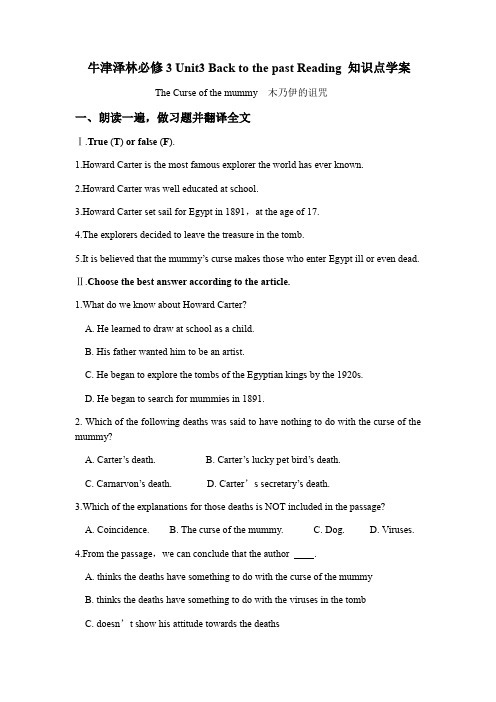
牛津泽林必修3 Unit3 Back to the past Reading 知识点学案The Curse of the mummy 木乃伊的诅咒一、朗读一遍,做习题并翻译全文Ⅰ.True (T) or false (F).1.Howard Carter is the most famous explorer the world has ever known.2.Howard Carter was well educated at school.3.Howard Carter set sail for Egypt in 1891,at the age of 17.4.The explorers decided to leave the treasure in the tomb.5.It is believed that the mummy’s curse makes those who enter Egypt ill or even dead.Ⅱ.Choose the best answer according to the article.1.What do we know about Howard Carter?A. He learned to draw at school as a child.B. His father wanted him to be an artist.C. He began to explore the tombs of the Egyptian kings by the 1920s.D. He began to search for mummies in 1891.2. Which of the following deaths was said to have nothing to do with the curse of the mummy?A. Carter’s death.B. Carter’s lucky pet bird’s death.C. Carnarvon’s death.D. Carter’s secretary’s death.3.Which of the explanations for those deaths is NOT included in the passage?A. Coincidence.B. The curse of the mummy.C. Dog.D. Viruses.4.From the passage,we can conclude that the author .A. thinks the deaths have something to do with the curse of the mummyB. thinks the deaths have something to do with the viruses in the tombC. doesn’t show his attitude towards the deathsD. thinks the deaths are just coincidence二、知识点分析1.curious adj.好奇的,求知欲强的n.____________ adv.____________※be/become curious about对……感到好奇be curious to do sth.想做某事out of curiosity出于好奇with curiosity=curiously好奇地(1)我只好解释原因来满足他的好奇心。
高中英语 Unit3 Back to the past Reading课件1 牛津
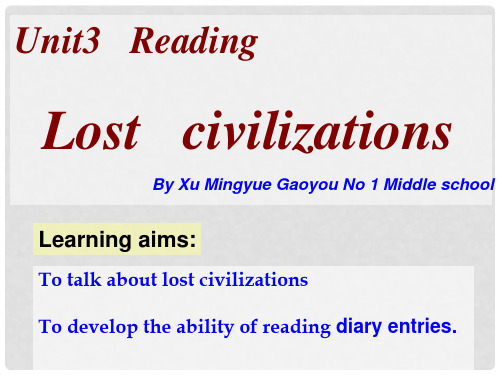
The great Pyramids at Giza
Step 1 Lead-in0001. - .flv
What made Pompeii become a lost civilization?
Step 1 Lead-in
1.What are the four great ancient
civilizations?
Ancient Babylon, ancient Egypt, ancient China and ancient India. Human beings today have a lot of philosophy, science, literature, art and other knowledge, which can be traced back to the contribution of these ancient civilizations.
Main structure
Part 1 ____D_a_y_1___ Part 2 _D_a_y_2_, _D_a_y_3_
preparation a visit to _P_o_m__p_e_ii
Part 3 D_a_y_1_0_,_D_a_y_1_1_ a visit to _L_o_u_l_a_n_
Step 1 Lead-in
2.What are the seven wonders of
the ancient world?
The Lighthouse at Alexandria The Colossus of Rhodes
The Mausoleum of Halikarnassos The Statue of Zeus,
高一英语 Module 3 Unit 3 Back to the past 教案牛津版

Unit 3 Back to the pastReading1. This morning we went to a lecture about Pompeii.lecture(1)[].演讲,讲课;谴责,训诫give / deliver a lecture to sb. on sth. 关于某事进行演讲have a lecture 听演讲go to a lecture 去听演讲give sb. a lecture 训诫某人学生每天有课。
The students have lectures every day.The famous professor delivered a lecture on how to protect the environment.这个著名的教授就保护环境问题做了个讲座。
(2)v. 作演讲,讲课Smith 先生正在讲授俄国文学。
Mr. Smith is lecturing on Russian literature.2. Unfortunately, all the people were buried alive.(1) unfortunately 位于句首,作状语,用来修饰整个句子。
其他类似的词:luckily, frankly, obviously, exactly, honestly, generally, certainly, fortunately( C ) Two middle-aged passengers fell into the sea. _______, neither of them could swim.A. in factB. LuckilyC. UnfortunatelyD. Naturallyfortune n. [U] 运气tell one’s fortune 给某人算命[C] 财富make a fortune 发财fortunate adj. 幸运的,侥幸的unfortunate adj.不幸运的,倒霉的(2) bury vt. 埋葬,失去〔某人〕,掩埋/掩藏burial n 埋葬He was buried in his hometown.She’s eighty-five and has buried three sons.The house was buried under ten feet of snow.Jean always has her head buried in a book.简总是埋头读书。
2017-2018学年高中英语 Unit 3 Back to the past Section Ⅰ
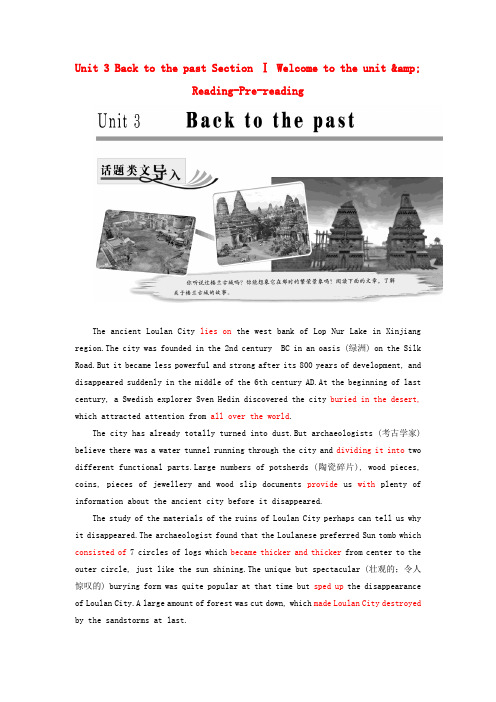
Unit 3 Back to the past Section Ⅰ Welcome to the unit &Reading-Pre-readingThe ancient Loulan City lies on the west bank of Lop Nur Lake in Xinjiang region.The city was founded in the 2nd century BC in an oasis (绿洲) on the Silk Road.But it became less powerful and strong after its 800 years of development, and disappeared suddenly in the middle of the 6th century AD.At the beginning of last century, a Swedish explorer Sven Hedin discovered the city buried in the desert, which attracted attention from all over the world.The city has already totally turned into dust.But archaeologists (考古学家) believe there was a water tunnel running through the city and dividing it into two different functional rge numbers of potsherds (陶瓷碎片), wood pieces, coins, pieces of jewellery and wood slip documents provide us with plenty of information about the ancient city before it disappeared.The study of the materials of the ruins of Loulan City perhaps can tell us why it disappeared.The archaeologist found that the Loulanese preferred Sun tomb which consisted of 7 circles of logs which became thicker and thicker from center to the outer circle, just like the sun shining.The unique but spectacular (壮观的;令人惊叹的) burying form was quite popular at that time but sped up the disappearance of Loulan City.A large amount of forest was cut down, which made Loulan City destroyed by the sandstorms at last.Section_ⅠWelcome to the unit & Reading —Prereading对应学生用书P62 [原文呈现][读文清障]Lost civilizations①Day 1, 15 JulyI feel lucky to have won a place on this trip.We are in Italy now, and tomorrow we are visiting Pompeii.Next week we are flying②to China, and going to Loulan, which is known as China's Pompeii in the desert③.Both Pompeii and Loulan became lost civilizations long ago.Day 2, 16 JulyThis morning we attended a lecture④ about Pompeii.The city was founded⑤ in the 8th century BC⑥.In 89 BC, the Romans⑦took over⑧ Pompeii.It then became a rich and busy city.Near the city was a volcano⑨.On 24 August AD⑩79, the volcano erupted⑪ and lava ⑫, ash⑬ and rocks poured⑭ out of it onto the surrounding countryside.It continued to erupt for the next two days.Many①civilization/ˌsIvəlaI'zeIʃn/n.文明②are visiting 和 are flying 都是现在进行时,表示的是将要发生的动作。
- 1、下载文档前请自行甄别文档内容的完整性,平台不提供额外的编辑、内容补充、找答案等附加服务。
- 2、"仅部分预览"的文档,不可在线预览部分如存在完整性等问题,可反馈申请退款(可完整预览的文档不适用该条件!)。
- 3、如文档侵犯您的权益,请联系客服反馈,我们会尽快为您处理(人工客服工作时间:9:00-18:30)。
Unit 3 Back to the pastReading Lost civilizations如皋市搬今中学:朱军Teaching aims:1.Enable students to grasp the words about civilizations.2.Develop their creative, comprehensive and consolidating abilities.Teaching difficult and important points:1.Understand the lost civilizations better.2.Develop their reading abilities.Teaching procedures:Activity 1 Lead-inShow the pictures representing ancient civilizations on page 41. Please talk about the pictures according to the following questions.1.Where are the places in the pictures?The Statue of Zeus (ancient Greece)The Taj Mahal (India )The Hanging Gardens (ancient Babylon)The Potala Palace ( China )2. What does the title Lost Civilizations mean?Activity 2 Fast-readingRead the text quickly for three minutes and then answer the following questions:1. What country is the author from?2. What is one main similarities between Pompeii and Loulan?3. Who was made director of the Pompeii dig in 1860?4. Who is Professor Zhang?Activity 3 Careful-readingReading strategy:When you are reading diary entries recording some one’s travels, you should look for:⑴Dates and place names⑵Facts and historical information⑶Personal feelings and opinionsGive the students some minutes to go through the text and give the answers to the following questions:(1) What happened to Pompeii in August AD 79?(2) How was the buried city discovered?(3) What were the stepping stones along the road in Pompeii used for?(4) Who found the lost Loulan?(5) How do many people think Loulan disappeared?(6) What’s one main similarity between Pompeii and Loulan ?I was so excited to be picked to _____1_____ Canada. I have been to ___2______ inItaly and am now in China visiting Loulan.Both places were important __3________ cities about 2,000 years ago. They both disappeared and became lost ___4_______. Pompeii was destroyed by a __5_____. It __6_____ and covered Pompeii with ash. Loulan disappeared under the _7___. No one is quite sure why. There are just a few ___8_ left. Some __9_____, such as coins and painted pots, was found, and recently some tombs. I am becoming very interested in ancient civilizations. Maybe I shall become an ______10_____ one day.Activity6 Language points1.Next week we are flying to China, and going to Lou lan, which is known as China’sPompeii in the desert.be known(famous) as sth/ for sth/ to sb.Eg: Luxun was known ____ a writer.Dali is famous _____ her beautiful scenery.This theory is known ______ us all.2. In 89BC, the Romans took over Pompeii.take over 夺取,接管Eg: The firm has ________________(接管) by a large company.复习有关take的短语收回___________ 写下,记下___________吸收,欺骗_________ 占用,从事__________控制_____________ 起飞;腾飞___________Eg: I __________ what I said.I will __________ her address.Don’t _________ by his promises.The plane __________ at 8 A.mHe is so poor that the couple decide to ______ him ______.Important people don’t often have much free time as their work ______ all their time.3. Near the city was a volcano called Vesuvius.本句是个倒装句。
当句首为表示地点的介词短语,谓语动词为be, stand, sit, lie, come, hang等动词时,使用倒装句。
注意主谓一致。
Eg: Between the two mountains ______ a small village.On the wall _______(hang) a picture.Around the school _______ many green trees.4. Unfortunately, all the people were buried alive, and so was the city!▲ be buried alive 被活埋bury 埋;埋葬________ in deep thought, he didn’t notice Mary coming in._________ himself in sorrow, he refused to see anyone._________ yourself in your study, and you will make progress★so was the city 是个倒装句。
其基本句型为:so+助动词/情态动词/系动词+sb./sth.意为某人/某物也像上文中的人/物一样。
其中,助动词,情态动词和系动词在人称、数上要和其后的主语保持一致,在时态上与上文相一致。
表否定时用neither 或nor。
Eg: I am a teacher, so is he .He studies hard, so _____________.(她也是)The man wasn’t buried in his hometown,___________________.(他的父母也是如此。
) 但是,如果把其基本形式换成:So+ sb./sth.+助动词/情态动词/系动词意为:某人/某物的确如此。
表示同意,附和他人的看法和观点。
Eg: Tom speaks Chinese well.So he does.---Xiao Li is a good man.---____________.(的确如此)---It was a fine day yesterday.---_____________. (是这样的)/区分:--- _____________today. (今天也一样)5. When I walked around the city, I saw streets just as they had been, with stepping stones alongthe road ----有关with的复合结构:with + n. + n./ adj./ adv.+ doing / done / to do+ prep phrasesPractice:The teacher came in, with some books ____________.(手里拿着一些书)He likes to sleep, with the lights ____.(开着灯)With so much work _______,(由于有许多事要做)he had to get up early.With the boy ________________,(由于有那个孩子的带路) we could find the place quickly6. I also saw the bodies of people that had been turned to stone when they had been coveredwith ash ---- they are kept exactly as they were 2,000 years ago.▲turn to 意为“变成”,还可表示:求助于,转到,转向例: There was no single person ____ she could turned in the street.A. thatB. whoC. from whomD. to whomkeep…as they were (/ as it was) 这里意思是“保持着原来的样子”。
